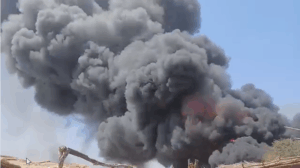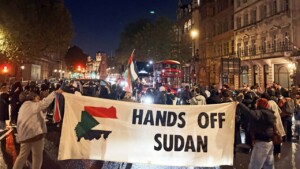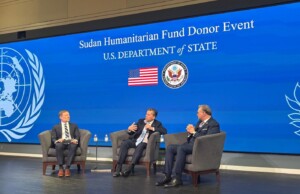Darfur displaced demand protection from armed criminals
Leaders of the displaced people of Darfur have decried the proposed withdrawals of the Unamid peace keeping force, and demand protection after repeated violent attacks.
 Market place in a camp in Gireida, South Darfur (File photo: Robert Lankenau)
Market place in a camp in Gireida, South Darfur (File photo: Robert Lankenau)
Displaced community leaders in Darfur have decried the proposed withdrawals of the Unamid peace keeping force, and demand protection after repeated attacks.
Coordinator of the Central Darfur camps El Shafee Abdallah told Radio Dabanga that unknown assailants attacked Taha Ibrahim on Tuesday in Hasaheisa camp for the displaced, causing him serious wounds. He was transferred to Zalingei Hospital.
On Thursday, a massive fire broke at camp El Salam in Gireida in South Darfur which completely destroyed 150 homes, and caused extensive damage to another 50 shelters.
Sheikh Mousa Hasan told Radio Dabanga that the fire broke out yesterday afternoon at El Salam and destroyed all property and agricultural crops in the houses. He said the total damages and losses are still being assessed.
'Not satisfied'
On Wednesday, a delegation from the US State Department and the US embassy in Khartoum visited camp Hamidiya in Zalingei, capital of Central Darfur, and met with the leaders of the displaced camps in the town.
El Shafee Abdallah told this station that the delegation asked the opinion of the displaced people regarding the work of the UN-AU Mission in Darfur (Unamid), the ongoing peace negotiations in Juba, and the conference to be held by the peace commission. They also discussed identifying the form of management of the camps, the number of displaced and the villages they have returned to, along with the challenges facing the camp today.
He indicated that the displaced people assured the visiting delegation of their rejection of the exit programme for Unamid from Darfur, while not being satisfied with its work at the present time.
They demanded that the mission spread throughout the region, conduct patrols to protect the displaced, and establish a section to monitor the mission’s work in protecting the displaced.
Radio Dabanga’s editorial independence means that we can continue to provide factual updates about political developments to Sudanese and international actors, educate people about how to avoid outbreaks of infectious diseases, and provide a window to the world for those in all corners of Sudan. Support Radio Dabanga for as little as €2.50, the equivalent of a cup of coffee.












 and then
and then